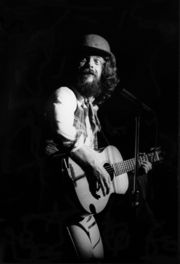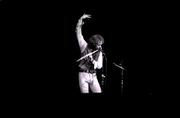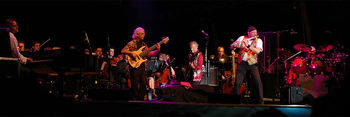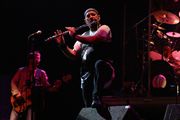Ian Anderson (musician)
| Ian Anderson | |
|---|---|
 Anderson performing in Milan, Italy |
|
| Background information | |
| Birth name | Ian Scott Anderson |
| Born | 10 August 1947 Dunfermline, Fife, Scotland |
| Genres | Progressive rock, folk rock, hard rock, blues rock |
| Occupations | Musician, songwriter |
| Instruments | Vocals, flute, guitar, bass, bouzouki, balalaika, mandolin, harmonica, soprano saxophone, keyboards, whistle |
| Years active | 1962–present |
| Labels | Chrysalis, Fuel 2000, RandM |
| Associated acts | Jethro Tull |
| Website | IanAnderson.com |
Ian Scott Anderson, MBE (born 10 August 1947) is a British singer, songwriter and multi-instrumentalist, best known for his work as the leader of British rock band Jethro Tull.
Contents |
Early life
Ian Anderson's father, James Anderson, ran the RSA Boiler Fluid Company[1] in East Port, Dunfermline. He spent the first part of his childhood in Edinburgh.
His family moved to Blackpool, Lancashire in 1959, where he gained a traditional education at Blackpool Grammar School,[2] before going on to study fine art at Blackpool College of Art from 1964 to 1966.
Early career
While a teenager, Anderson took a job as a sales assistant at Lewis' department store in Blackpool, then as a vendor on a newsstand. He later said it was reading copies of Melody Maker and the New Musical Express during his lunch breaks that gave him the inspiration to play in a band.

In 1963, he formed The Blades from among school friends: Barriemore Barlow (drums), John Evan (keyboards), Jeffrey Hammond (bass) and Michael Stephens (guitar). This was a soul and blues band, with Anderson on vocals and harmonica – he had yet to take up the flute.
At this time Anderson abandoned his ambition to play electric guitar, allegedly because he felt he would never be "as good as Eric Clapton". As he himself tells it in the introduction to the video "Live at the Isle of Wight", he traded his electric guitar in for a flute which, after some weeks of practice, he found he could play fairly well in a rock and blues style. According to the sleeve notes for the first Tull album, "This Was", he had been playing the flute only a few months when the album was recorded. His guitar practice was not wasted either, as he continued to play acoustic guitar, using it as a melodic as well as rhythmic instrument. As his career progressed, he added soprano saxophone, mandolin, keyboards and other instruments to his arsenal.
His famous tendency to stand on one leg while playing the flute came about by accident. As related in the "Isle of Wight" video, he had been inclined to stand on one leg while playing the harmonica, holding the microphone stand for balance. During the long stint at the Marquee Club, a journalist described him, wrongly, as standing on one leg to play the flute. He decided to live up to the reputation, albeit with some difficulty. His early attempts are visible in the The Rolling Stones Rock and Roll Circus film appearance of Jethro Tull. In later life he was surprised to learn of iconic portrayals of various flute playing divinities, particularly Krishna and Kokopelli, which show them standing on one leg.
Later career

Photo Courtesy: Jean-Luc Ourlin
While Anderson has recorded a small number of critically acclaimed projects under his own name, and frequently makes guest appearances in other artists' work, he has been identified in the public eye as the frontman of Jethro Tull for 40 years.
This is undoubtedly because a signature motif of Anderson's career has been a highly distinctive stage image, which has often been counter to the prevailing rock music culture. While he has habitually drawn inspiration from British folklore – at different times deploying stylistic elements of mediaeval jester, Elizabethan minstrel, English country squire and Scottish laird – at other times he has appeared as astronaut, biker, pirate and vagrant. His personae often involve a large degree of self-parody.
As a flautist, Anderson is self-taught; his style, which often includes a good deal of flutter tonguing and occasionally singing or humming (or even snorting) while playing, was influenced by Roland Kirk. In 2003 he recorded a composition called Griminelli's Lament in honour of his friend, the Italian flautist Andrea Griminelli. In the 1990s he began working with simple bamboo flutes. He uses techniques such as over-blowing and hole-shading to produce note-slurring and other expressive techniques on this otherwise simple instrument.
Anderson plays several other musical instruments, including acoustic and electric guitar, bass, bouzouki, balalaika, saxophone, harmonica, and a variety of whistles.

He has recorded several songs on which he plays all the instruments as well as carrying out all the engineering and production (such as 1988's "Another Christmas Song"). Anderson's music blends styles such as folk, jazz, blues, rock and pop. His lyrics are frequently complex, (mostly) tongue-in-cheek criticism of the absurd rules of society and/or religion ("Sossity, You're a Woman"; "Hymn 43"; "Thick as a Brick"). He often combines lyrics with other leitmotifs such as [folk, mythological, fantastic ("The Minstrel in the Gallery", "Jack-in-the-Green", "Broadsword and the Beast"). In the 1990s and 2000s, Anderson's songs often capture 'snapshots' of his daily life ("Old Black Cat", "Rocks on the Road").
Recognition
In recognition of his life-long contribution to popular music, Anderson received two honours in 2006: the Ivor Novello Award for International Achievement and an honorary Doctorate of Literature at Heriot-Watt University, on 11 July 2006.
He remains widely regarded as the man who introduced the flute to rock music, and the only one who uses it as his main instrument. He is also considered the first rock musician to utilize a classical orchestral instrument and develop music to use it as a lead instrument. Other flute players to gain recognition now include Walter Parazaider of Chicago, Burton Cummings of The Guess Who, Ian McDonald of King Crimson, Ray Thomas of the Moody Blues, Thijs van Leer of Focus, Chris Wood of Traffic, Andrew Latimer of Camel, Jerry Eubanks of The Marshall Tucker Band and Peter Gabriel during his years with Genesis, however none but Gabriel and Wood gained anything close to the amount of recognition utilizing the instrument.
Anderson was appointed Member of the Order of the British Empire (MBE) in the 2008 New Year Honours.
Musical collaborations and other work

Ian Anderson plays flute on the Men Without Hats song "On Tuesday" from their album Pop Goes the World (1987), and on the Blackmore's Night song "Play, Minstrel, Play" from their debut album Shadow of the Moon (1997).
Ian Anderson appears as a guest on the song "All Along You Know" from The Big Prize, the second album by Canadian rock band Honeymoon Suite. This followed Jethro Tull's 1984 tour on which Honeymoon Suite was one of the opening acts. Also in 1984, Ian Anderson, along with Martin Barre, Dave Pegg and Peter-John Vettese recorded A Classic Case with the London Symphony Orchestra, performing a selection of music from Jethro Tull. He was also a DJ on Planet Rock, presenting his own two-hour show Under The Influence. He also appeared on stage with Joe Bonamassa playing A New Day Yesterday at the Hammersmith Apollo in May 2010.
Anderson performs as a special guest on two Uriah Heep live albums: Acoustically Driven and Electrically Driven, on both performing the same two songs of Uriah Heep repertoire: Circus and Blind Eye.
Ian Anderson plays flute on the track "Portmeirion" on Fairport Convention's 2001 album 'XXXV'. Anderson has performed with Fairport Convention at their annual Cropredy Festival on several occasions since the mid-1980s, when their bass player Dave Pegg was also a member of Jethro Tull.
Anderson produced Steeleye Span's 1974 album Now We Are Six, as well as appearing on and producing Steeleye Span member Maddy Prior's first solo album "Woman In The Wings", for which Jethro Tull made most instrumental contributions.
Family and personal life
From 1970 to 1974, Anderson was married to Jennie Franks, a photographer who is credited with writing most of the lyrics to the song Aqualung. Anderson married Shona Learoyd in 1976, described by Rolling Stone magazine as a "beautiful convent-educated daughter of a wealthy wool manufacturer"[3]. She had studied ballet for 10 years, though Anderson met her when she was working as a press officer at Jethro Tull's then record-label Chrysalis Records. She later became involved with the band's on-stage special effects.
The couple have lived in a 16th-century redbrick farmhouse on the 500-acre Pophleys estate in Buckinghamshire, England, and on the Isle of Skye in Scotland. They currently live in Wiltshire, England. They have two children: James Duncan Anderson, also a musician; and Gael, who works in the film industry and is married to the actor Andrew Lincoln.
Anderson is a survivor of deep vein thrombosis, and has done several public service announcements to raise awareness of the disease.
Among his interests Anderson lists protecting wild cats, especially those that have been rescued from harsh captivity; cameras, chiefly Leicas; Indian cuisine – he has written a beginner's guide, thus far published only on the Internet.[4]
Anderson describes himself as being "somewhere between Deist and Pantheist" religiously, according to his foreword to the pamphlet for his 2006 St. Brides charity concerts for the homeless.[5]
Anderson has never taken the driving test, though he lists off-road motorcycling among his interests.
Anderson is an avid Seattle Mariners fan.
Business activities
Anderson is a successful businessman away from the music industry, and he has owned several salmon farms in New England. His Strathaird concern[6], based on his estate on the Isle of Skye was worth £10.7 million in the late 1990s, when parts of it began to be sold off. He currently owns a group of companies which reported a gross profit of £1.8 million in 2004, when the Sunday Herald newspaper reported:
He and his wife Shona, the sole shareholders and directors, shared a £500,000 dividend and emoluments, excluding pension contributions, of £850,954. A modest pre-tax loss of £5,806 was booked for the year but the balance sheet shows shareholders’ funds stand at £3.2m. Income included a payment of £209,517 following one of the rock group’s regular checks on its flow of royalties.[7]
Solo discography
| Year | Name | Type | Label | Peak chart position | ||
|---|---|---|---|---|---|---|
| USA | UK | Germany | ||||
| 1983 | Walk into Light | Studio album | Chrysalis Records | 78 | ||
| 1995 | Divinities: Twelve Dances with God | " | EMI | 1 | ||
| 2000 | The Secret Language of Birds | " | Fuel 2000 | 26 | ||
| 2003 | Rupi's Dance | " | RandM Records | 40 | ||
| 2005 | Ian Anderson Plays the Orchestral Jethro Tull | Live album/DVD | ZYX Music | 68 (CD) 3 (DVD) |
||
Notes
- ↑ "Tull Press". http://www.tullpress.com/dp19oct79.htm.
- ↑ Nollen, Scott Allen. Jethro Tull: A History of the Band, 1968–2001, p. 23. McFarland, 2001. ISBN 0786411015
- ↑ "Rock's heaviest breather is Ian Anderson". 1977-03-21. http://www.tullpress.com/p21mar77.htm. Retrieved 2007-04-22.
- ↑ Ian Anderson. "Indian Food Guide". http://www.j-tull.com/musicians/iananderson/indian.html. Retrieved 2007-04-22.
- ↑ "Ian Anderson's Diary – January 2007". http://www.iananderson.com/news/diaries/iaja2007.html. Retrieved 2007-04-22.
- ↑ "Strathaird Salmon Ltd". http://www.macrae.co.uk/mini_sites/strathaird. Retrieved 2007-04-22.
- ↑ Jim Gough (2004-05-30). "Anderson swaps fish for his flute". Sunday Herald. http://web.archive.org/web/20040607035038/http://www.sundayherald.com/42278. Retrieved 2007-04-22.
External links
- 2006 Ian Anderson Interview
- Confessions of a DVT Victim and Ten Tips for Survival
- Bio from Official J-Tull Website
- Ian Anderson at the Internet Movie Database
- Site of Dutch fan, with annotations of Tull music
- Planet Rock show
- Audio interview at BBC Wiltshire
- College Crier's Ian Anderson Interview
- Audio Interview segments with Ian Anderson
- Ian Anderson lengthy Interview
|
||||||||||||||||||||||||||